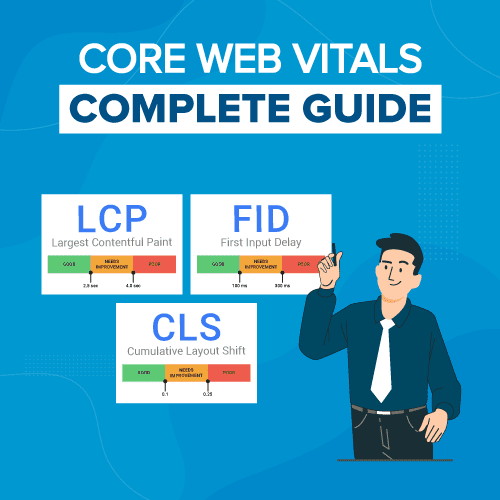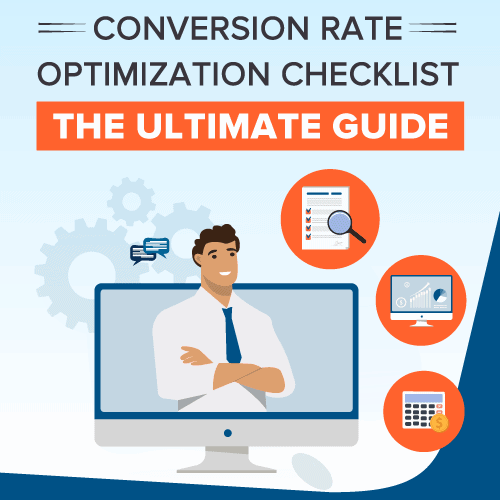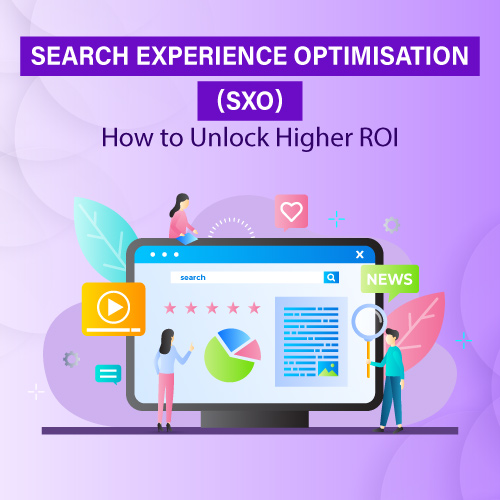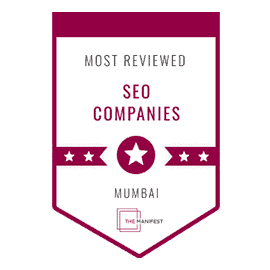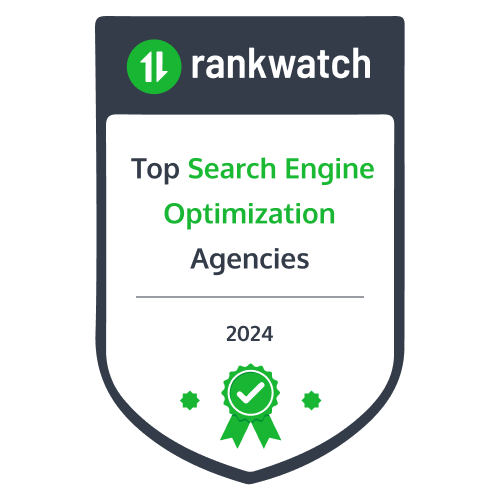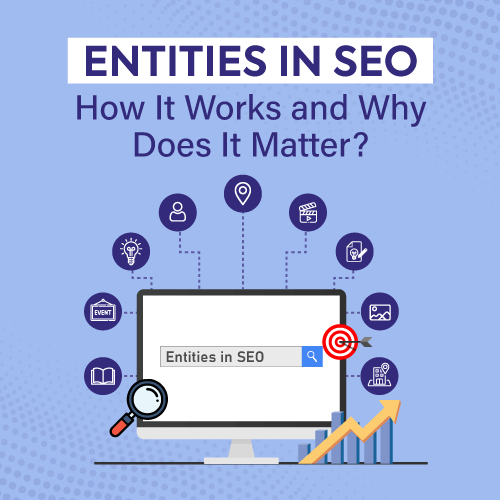
In SEO, an entity is outlined as all that is explicitly definable—a noun, place, or thing. Unique and separable are the main qualities that define a valid entity. Knowing how entities in SEO works can change your business’s outlook by boosting its online reputation, enhancing visibility, and driving organic traffic.
Understanding Entities in SEO
Let’s understand entity SEO in-depth:
What are Entities in SEO?
- Entities as Building Blocks: Entities in search are like logbooks in a database. They refer to the various elements present within the content that search engines understand. These elements or entities can be anything distinctive, such as people, places, organizations, events, or concepts.
- Beyond Keywords: Unlike traditional keyword-focused SEO, which primarily targets specific keywords or phrases, entity-based SEO revolves around semantic search. The focus is to grasp the context and meaning behind words.
How do Entities Impact Semantic SEO?
When it comes to semantic SEO, entities and keywords, work closely to hook a user’s intent. Rather than focusing entirely on keywords, semantic SEO highlights understanding the context and relevancy of keywords within the entities.
Entities in Semantic SEO help search engines interpret content literalistically to deliver precise results in response to user queries. This empowers search engines to comprehend content more human-likely, leading to better search visibility, improved user experience, and increased organic traffic.
Now the question is, why are entities essential for search engines?
It recognizes entities and their relationships within content, which helps to interpret content accurately. Because of entities, search engines can deliver more precise search results that align with user intent.
For example, if you search for “movies with SRK,” Google knows how one entity (SRK, a.k.a. Shah Rukh Khan, an Indian actor) is connected to other entities (the films he has been in). Google then uses the Knowledge Graph to identify the movies as entities and find the options as per your search query.
How to Optimize Content Accordingly?
Optimizing content accordingly involves several key strategies to ensure it aligns with entity-based SEO principles:
- Identify Relevant Entities
Do in-depth research. Identify entities that are to the point and are related to your content’s topic. These entities could include people, places, organizations, events, or concepts that are central to the subject matter. Make a detailed SEO checklist to make the process smooth.
- Incorporate Entities Naturally
Integrate the identified entities naturally throughout your content. Make sure they fit contextually and enhance the overall meaning and relevance of the text. Avoid keyword stuffing. Focus on giving valuable information to the reader.
- Utilize Structured Data Markup
Implement structured data markup using Schema.org or other appropriate formats to define the entities present in your content explicitly. This markup helps search engines understand the relationships between entities and display rich snippets in search results.
- Optimize for Semantic Search
Shift your optimization focus from individual keywords to semantic search by emphasizing context and intent. Create content that addresses user queries comprehensively and provides valuable insights beyond simple keyword matching.
- Enhance User Experience
Prioritize the user experience. Make sure your content is in apple-pie order. It needs to be informative, detailed, easy to read, and engaging. Add descriptive headings. Use bullet points and multimedia elements to break up the monotonous nature of text and improve readability.
- Monitor Performance
Regularly perform SEO audit. Monitor how your optimized content is performing. Use analytics tools. Track metrics like organic traffic, click-through rates, and engagement to check the effectiveness of your optimization efforts and make adjustments if you have to.
You’ve Finally Found the Right SEO Agency!
Capsicum has the SEO solutions you’ve been searching for. Don’t let another day go by where your competitors are looking down on you! It’s time to be discovered!
Get Started NowThe Evolution of Entity-Based SEO
Here’s how SEO has evolved:
- Early Keyword-Centric Approach: In the beginning, SEO was all about keywords. The more a website mentioned specific keywords, the higher it ranked. This often led to unnatural content filled with repetitive keywords, offering little value to users.
- Semantic Search: Search engines started to consider the “WHY” behind a search query. Instead of just keyword matching, they analyzed the context and user intent. This led to a focus on creating high-quality, informative content that truly addressed user needs.
- Knowledge Graphs: Search engines began incorporating knowledge graphs, massive databases of interconnected entities. This allowed them to understand how entities relate to each other and provide more comprehensive search results.
- Shift Towards Entity-Based Ranking Factors: Today, entity-based SEO is king. Ranking algorithms now consider factors like entity relevance, notability, and contribution to a specific topic. Websites that establish themselves as authorities within their entity space get a ranking boost.
- Structured Data for Clarity: Structured data markup (like Schema.org) helps websites explicitly tell search engines about the entities and relationships present on their pages. This ensures better understanding and improves content visibility.
- Putting Users First: Ultimately, SEO is about users. Entity-based SEO encourages creating valuable content that aligns with the entities your target audience cares about. By addressing user intent, preferences, and pain points, you deliver a better user experience and attract more organic traffic.
How Does Google Utilize Entities in SEO?
Google uses entities to understand the context and relevance of web content. Instead of relying solely on keyword matching, Google’s algorithms analyze the entities mentioned in a piece of content to determine its subject matter and intent. This semantic understanding allows Google to provide more accurate search results to users, matching their queries with content that fully addresses their needs.
Entities are not just individual keywords but encompass a broader spectrum of concepts, including people, places, events, and organizations. By recognizing these entities and their relationships within content, Google can deliver more relevant search results and enhance the user experience.
Furthermore, Image SEO and Google’s Knowledge Graph rely heavily on entities to provide structured search results, such as knowledge panels and rich snippets, which offer users quick access to relevant information.
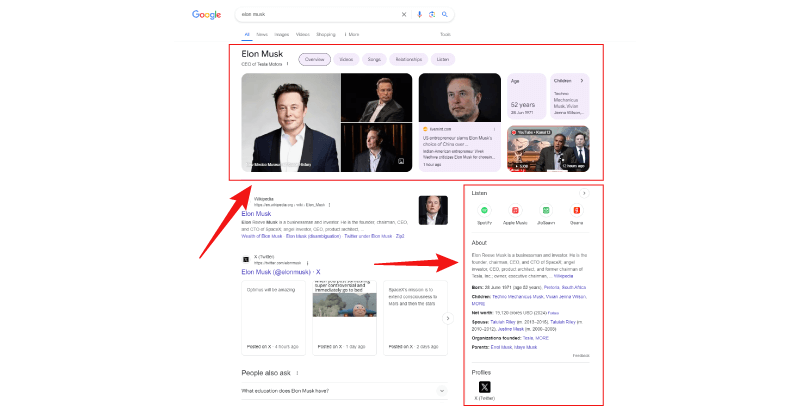
In short, Google Entities SEO represents a shift towards understanding content in a more nuanced and contextually rich manner, ultimately improving search relevance and user satisfaction.
What Is the Difference Between SEO and Entity-Based SEO?
Let’s find out the difference between entities and SEO:
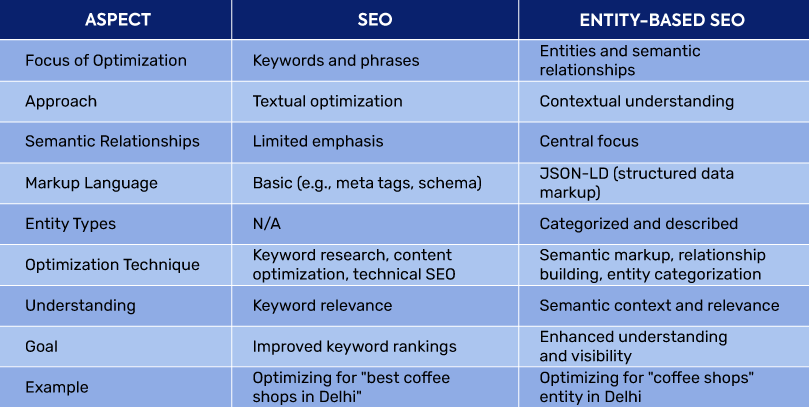
Strategies for Optimizing SEO with Entities
If you invest in SEO, you must understand how to optimize with entities. Following are some of the most important strategies for you:
Implement Structured Data Markup
An integral part of entity optimization is structured data markup, particularly using Schema.org. Integrating this into your website’s code gives search engines explicit signals about the entities on your web pages and their relationships. It also helps search engines figure out the content better, and can lead to better visibility in search results. For example, using schema markup for a cooking recipe can have details like ingredients, cooking time, nutrition information, etc. It allows search engines to show rich snippets in SERPs, which can boost click-through rates.
Focus on Entity Relationships
Entities in SEO are not standalone elements but interconnected entities forming a semantic network. Identifying and enhancing the connections between entities on your website will help you strengthen entity relationships. Start by understanding how different entities relate to each other. Create a more all-inclusive and well-grounded semantic structure.
For example, in terms of an e-commerce website, building relationships between products, categories, and brands can help improve navigation and the user experience. This may lead to higher engagement and conversions.
Optimize Content for Entities
Content optimization in entity-based SEO goes beyond traditional keyword targeting. Instead, it involves creating content that aligns with the entities relevant to your target audience. This means understanding the context and intent behind user queries and then coming up with content that addresses their needs and interests. This way, you can improve its relevance and authority, making it more likely to rank better in search results.
For example, a travel website can optimize its content for destination entities by presenting detailed guides, reviews, and travel tips specific to each location.
Leverage Entity-Based Internal Linking
Internal linking plays a crucial role in setting up the semantic structure of your website. By deliberately linking related entities within your content, you can reinforce their relationships and improve the overall clarity of your website. This enhances user navigation and helps search engines find and index content more conclusively.
For example, a blog post regarding digital marketing can link to related articles on SEO, content marketing, and social media marketing, creating a network of interconnected entities that signal expertise and authority to search engines.
Monitor and Analyze Entity Performance
Keeping a tab on the performance of entities on your website is essential for identifying strengths, weaknesses, and opportunities. You can gain valuable insights into their usefulness by going over their metrics (organic traffic, engagement, conversions, etc.) linked with specific entities. Also, having a CRO checklist will refine your entity optimization strategies and make efforts where they will have the most impressive impact.
For example, suppose you notice that a certain product category is bringing a great number of organic traffic but has a relatively low conversion rate. In that case, you can concentrate on optimizing the content and user experience for that category to improve conversions.
Stay Updated with Algorithm Changes
Search engine algorithms are evolving nonstop, so being in the loop about changes in entity-based ranking factors is also essential. It maintains your website’s visibility and performance. With up-to-date algorithms and industry trends, you can adapt your SEO strategies accordingly. It will ensure that your website remains competitive in search results. From fine-tuning your approach to entity optimization to implementing new techniques or refining existing strategies, staying updated will allow you to watch out for potential impacts on your website and take proactive
measures to get rid of any negative effects.
You’ve Finally Found the Right SEO Agency!
Capsicum has the SEO solutions you’ve been searching for. Don’t let another day go by where your competitors are looking down on you! It’s time to be discovered!
Get Started NowTransform Your SEO Approach with Expert Entity Optimization!
As search engines continue to prioritize semantic understanding and context, effectively leveraging entities has become the first and foremost approach to achieving sustainable visibility and growth. Our SEO company in Mumbai practices cutting-edge entity optimization exclusively. Our all-inclusive SEO packages help you use entities, improve your SERPs or search engine rankings, drive targeted traffic to your website, and add to your conversions. Contact us today to learn more about our proven strategies and local SEO tips for multiplying your online visibility and driving sustainable growth.









